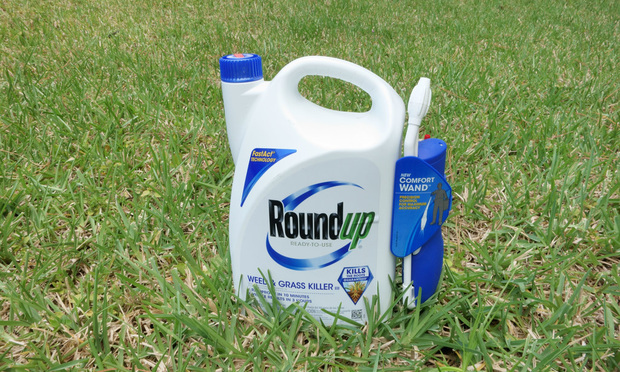
Roundup-Weed-Killer Photo: iStockphoto.com
Opening statements in the first trial over whether Monsanto’s Roundup herbicide caused a user to get cancer are set to begin on Monday in San Francisco.
Dewayne “Lee” Johnson, a former groundskeeper diagnosed with non-Hodgkin lymphoma four years ago, claimed in a lawsuit that his exposure to glyphosate, an ingredient in Monsanto’s herbicides, caused his terminal illness.
George Lombardi of Winston & Strawn is set to make the opening statement for Monsanto. Lombardi, who is based in Chicago, won a $1 billion verdict for Monsanto in a high-profile patent infringement trial against E.I. du Pont de Nemours & Co. in 2012.
Monsanto’s trial team also includes Sandra Edwards, chairwoman of the environmental law practice at Farella Braun + Martel in San Francisco, and Joe Hollingsworth of Hollingsworth LLP in Washington, D.C.
R. Brent Wisner of Baum Hedlund Aristei & Goldman in Los Angeles will make opening statements for Johnson. Lead plaintiffs counsel Michael Miller of The Miller Firm in Orange, Virginia, had to step down from the trial last month after he was injured in a sporting accident. Two other lawyers from Miller’s firm, Timothy Litzenburg and David Dickens, will be involved in the trial, as will Baum Hedlund’s Michael Baum and Pedram Esfandiary.
“I don’t know if I’d call it a bellwether,” said Baum, since the judge didn’t select the case through a bellwether selection process. “I’d call it an exemplar case that involves non-Hodgkin’s lymphoma induced by Roundup. The basic documents we’re relying on will be used for many of the cases in other courts coming forward.”
Monsanto Co., which is based in St. Louis, faces about 4,000 cases over Roundup. In 2015, the International Agency for Research on Cancer classified glyphosate as a possible carcinogen, but other regulatory agencies, including the U.S. Environmental Protection Agency, found no such link.
“More than 800 scientific studies, the U.S. EPA, the National Institutes of Health and regulators around the world have concluded that glyphosate is safe for use and does not cause cancer,” said Scott Partridge, vice president of global strategy at Monsanto, in a statement. “We have empathy for anyone suffering from cancer, but the scientific evidence clearly shows that glyphosate was not the cause. We look forward to presenting this evidence to the court.”
About 150 lawsuits have been coordinated in San Francisco Superior Court, one of which is Johnson’s case, which was brought in 2016. Johnson was working as a groundskeeper at the Benicia Unified School District when a severe skin rash led to his lymphoma diagnosis.
Johnson’s lawyers pushed for a trial preference given their client’s shortened life span. Monsanto initially fought the request, insisting that Johnson’s prognosis was unclear, but ended up reaching an agreement that allowed Johnson’s case to go to trial. In March, Monsanto asked for a trial continuance, but San Francisco Superior Court Judge Curtis Karnow denied that request.
Monsanto has attacked the science behind the lawsuits. On May 16, Karnow refused Monsanto’s request to toss several plaintiffs’ experts. Plaintiffs attorneys cited Karnow’s ruling in the multidistrict litigation, in which U.S. District Judge Vincent Chhabria of the Northern District of California, at a March 14 hearing in San Francisco, called the opinions of the plaintiffs’ experts “shaky,” and their evidence “sparse” and based on a “loosey-goosey field” of science. Chhabria hasn’t yet ruled on the experts.
“We’re hoping he follows Karnow’s lead in recognizing the extraordinary qualifications of our experts,” Baum said of Chhabria.
As for Johnson, Baum said his client might be able to come in to court for opening statements and his testimony.
“He’s not real well,” he said.

Leave a Reply